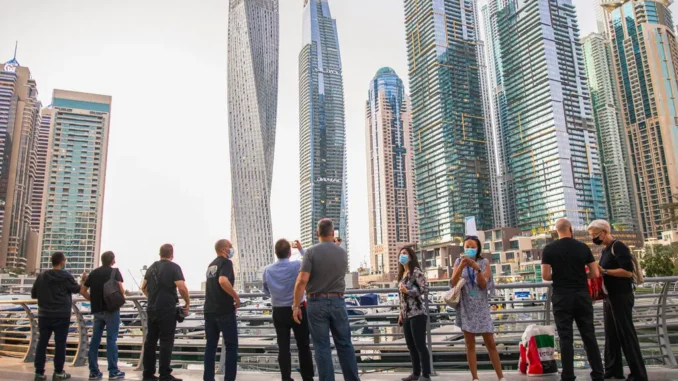T. Belman. This meeting was hastily organized probably at the request of the US who has been shut out by UAE, Saudi Arabia and Egypt. Although Saudi Arabia is not in attendance, the UAE will speak for them. The US is desperate for more support in the Ukraine conflict.
Four Arab foreign ministers will meet in Israel’s Negev desert on Sunday, along with their U.S. counterpart. The talks mark a realignment of Middle Eastern powers, accelerated by the war in Ukraine.

Credit…Dan Balilty for The New York Times
JERUSALEM — Israel’s meeting with top diplomats from four Arab countries and the United States, set to start on Sunday, is one of the strongest signs yet that the country is beginning to reap the dividends of normalization deals reached two years ago, a profound realignment of Middle Eastern powers that has been accelerated by the war in Ukraine.
The deals have also prompted Egypt, a long-time peace partner, to engage more meaningfully with Israel as Cairo tries to revive its role as Israel’s bridge to the Arab world. When Israel first announced the summit on Friday, Egypt was not on the list of countries attending — the United Arab Emirates, Morocco and Bahrain. But it was added on Saturday.
The ground-breaking meeting — the first involving so many Arab, American and Israeli officials on Israeli soil at once — is evidence of Israel’s acceptance by key Arab leaders, said Abdulkhaleq Abdulla, an Emirati political scientist. It suggests that the relationship between the United States and its Middle East partners is about to enter a new phase.
“This is a way to show that American friends, American partners, are speaking to America collectively, rather than individually,” he said. “Maybe that way, Washington will listen to us more on key issues.”
Most Arab countries have yet to formalize relations with Israel, and polls suggest that many people in the Arab world do not support normalizing ties with Israel. But to Gulf leaders, the cost of disappointing the Arab street is outweighed by the benefits of sending a strong message to both to their longtime benefactor, the U.S., and their shared enemy, Iran.
When Israel sealed diplomatic agreements in 2020 with several Arab countries that had long avoided formal ties, questions remained about how functional, how sustainable and how meaningful those deals would be. Even last month, when Naftali Bennett became the first Israeli prime minister to visit Bahrain, he acknowledged that relations still needed to evolve “from ceremonies to substance.”
The meeting in Negev desert town of Sde Boker on Sunday and Monday will almost certainly be heavy on spectacle and symbolism. But it is also unquestionably the substance Israel that has been hoping for.
Though the U.S. helped Israel broker the deals with the U.A.E., Morocco and Bahrain, it is Israel that can now act more publicly as a conduit between Washington and some Arab countries.
The meeting will provide a forum to discuss both disagreements and shared concerns about Ukraine and will give Mr. Blinken a chance to encourage Washington’s Middle East allies to align with American efforts to isolate Russia.
By hosting, Israel will bring together Secretary of State Antony J. Blinken with his Emirati counterpart, Abdullah bin Zayed Al Nahyan, at a time of friction between their countries over Russia’s invasion of Ukraine. The U.A.E. has so far dodged American demands to increase its oil production in order to help American allies find alternatives to Russian gas.
Israel — though praised by Washington for mediating between Russia and Ukraine — has also avoided imposing sanctions on Russia or condemning it too harshly. And Morocco, which relies on grain supplies from Russia and Ukraine and is facing a growing economic crisis, has also resisted American expectations to condemn the invasion.
Isolated for years by most of the Arab world, Israel is now working in tandem with Arab governments that have some common interests in the fallout from the war in Ukraine as well as a shared interest in containing Iran.
The foreign ministers will meet as American-backed efforts to secure a new nuclear deal with Iran reach a climax. The meeting will offer participants the chance to express concerns to Mr. Blinken about aspects of the proposed deal that they deem too lenient on Iran, and to encourage a distracted Washington to play a more active role in the region.
To be sure, Israel has long been a global player, dominant in the worlds of technology, cybersurveillance, military equipment, as well as a canny diplomatic operator long before the normalization process was finalized in 2020. It has historically been seen as a back channel to Washington, and clandestine relations between Israeli and Gulf officials began several years before they were announced in 2020.
But Israel’s ability to function as a public, high-profile broker between other countries — instead of mainly maintaining only its own bilateral ties, or passing quiet messages to Washington — feels new.
Not only has Israel demonstrably become a bridge between some Arab countries and the U.S., but Mr. Bennett has emerged as a mediator between Russia and Ukraine, even flying to Moscow this month to speak directly with Vladimir V. Putin, the Russian president.



Leave a Reply
You must be logged in to post a comment.